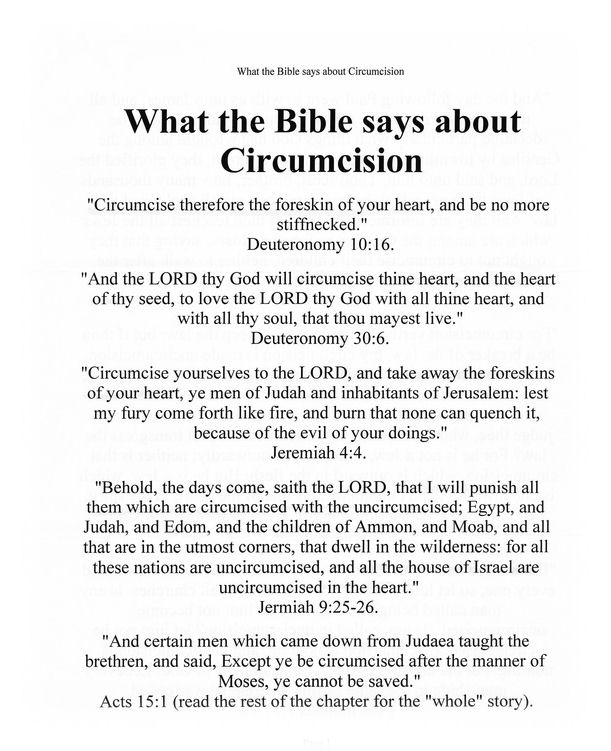Why Circumcision 1
 Why Circumcision
Why Circumcision
Genesis 17:10-14
When God entered into a covenant with Abraham. He told him to circumcise every make 8 years and older including himself. (Genesis 17:10-14)
Blood was shed, but it’s referred to as: “The Fountain of Life.” Which the place from which the seeds fear the future generation would come from – and the circumcision was a sign there was a covenant between God and Abraham.
Covenant of Circumcision
After Abram had sojourned in the land of promise twenty-four years, the Lord made a covenant with him and changed his name to Abraham ( Genesis 12:4 Genesis 12:5 ; Genesis 17:1-5 ). The Lord proposed to make of him a great nation and to perpetuate the covenant through his offspring ( Genesis 17:6 Genesis 17:7 ). Birth and purchase were the conditions of membership in this covenant ( Genesis 12:13 ). Of circumcision:
(a) It was a visible mark in the flesh. (b) It affected only the males of Abraham’s family. (c) The children were circumcised on the eighth day. (d) The uncircumcised were to be cut off from the covenant ( Genesis 17:6-14 ).
Religious male circumcision generally occurs shortly after birth, during childhood or around puberty as part of a rite of passage. Circumcision is most prevalent in the religions of Judaism, Islam, and some Christian denominations such as the Coptic Orthodox Church, the Ethiopian Orthodox Church, and the Eritrean Orthodox Church.
Many countries with majorities of Christian adherents have low circumcision rates (as in Europe and South America), while both religious and non-religious circumcision is common in some predominantly Christian countries such as the United States, and the Philippines and in North Africa and West Africa. It is common in countries such as Cameroon, the Democratic Republic of the Congo, Ethiopia, Eritrea, Ghana, Liberia,Nigeria and Kenya.
Circumcision is also widely practiced among Christians from South Korea, Egypt, Syria, Lebanon, Jordan, Palestine, Israel, and North Africa. Circumcision rates in Oceania were high but are now relatively low.
Circumcision practiced as a religious rite is found in texts of the Hebrew Bible, as part of the Abrahamic covenant, such as in Genesis 17, and is therefore practiced by Jews and Muslims, which are both Abrahamic religions.
While the Roman Catholic Church has condemned religious circumcision for its members, and currently maintains a neutral position on the practice of non-religious circumcision, it is customary in Coptic Christianity, Ethiopian Orthodox Church and Eritrean Orthodox Church, which keep it as a rite of passage. In Classical civilization, the foreskin was positively valued both from Ancient Greeks and Romans; Greek and Roman attempts to abolish ritual circumcision were prompted mostly by humanitarian concerns.
There are numerous references to religious male circumcision in the Hebrew Bible. Circumcision was enjoined upon the biblical patriarch Abraham, his descendants and their slaves as “a token of the covenant” concluded with him by God for all generations, an “everlasting covenant” (Genesis 17:13), thus it is commonly observed by two (Judaism and Islam) of the Abrahamic religions.
The penalty of non-observance was kareth (Hebrew: “cutting off”) from the people (Genesis 17:10–14, 21:4; Leviticus 12:3). Non-Israelite’s had to undergo circumcision before they could be allowed to take part in the feast of Passover (Exodus 12:48).
It was “a reproach” for an Israelite to be uncircumcised (Joshua 5:9). The name arelim (“uncircumcised”) became an opprobrious term, especially a pejorative name for the Philistines, who might have been of Greek origin, in the context of the fierce wars recounted in the First Book of Samuel (14:6, 31:4).
When the general (and future king) David wanted to marry King Saul’s daughter, the King required a grisly “dowry” of a hundred Philistine foreskins. David went further: “and David arose and went, he and his men, and slew of the Philistines two hundred men; and David brought their foreskins, and they gave them in full number to the king, that he might be the king’s son-in-law. And Saul gave him Michal his daughter to wife” (1 Samuel 18:25).
“Uncircumcised” is used in conjunction with tame (“unpure”) for heathen (Isaiah 52:1). The word arel (“uncircumcised”) is also employed for “impermeable” (Leviticus 26:41, “their uncircumcised hearts”; compare Jeremiah 9:25; Ezekiel 44:7–9); it is also applied to the first three years’ fruit of a tree, which is forbidden (Leviticus 19:23). “The Philistines, more than any other nation, are regularly called uncircumised” in the Hebrew Bible.
However, the Israelite’s born in the wilderness after the Exodus from Egypt apparently did not carry out the practice of circumcision. According to Joshua 5:2–9, “all the people that came out” of Egypt were circumcised, but those “born in the wilderness” were not. In any case, we are told that Joshua, before the celebration of the Passover, had them circumcised at Gilgal.
The Hebrew Bible contains several narratives in which circumcision is mentioned. There is the circumcision and massacre of the Shechemites (Genesis 34:1–35:5), the hundred foreskin dowry (1 Samuel 18:25–27) and the story of the Lord threatening to kill Moses, and being placated by Zipporah’s circumcision of their son (Exodus 4:24–26), and the circumcision at Gilgal of Joshua 5.
There is another sense in which the term “circumcise” is used in the Hebrew Bible. In the Book of Deuteronomy (10:16) it’s written: “Circumcise the foreskin of your heart,” (also quoted in Jeremiah 4:4, New JPS Tanakh translates as: “Cut away, therefore, the thickening about your hearts”) along with Jeremiah 6:10: To whom shall I speak, and give warning, that they may hear? behold their ear is uncircumcised, and they cannot hearken: … (the New JPS Tanakh translates: “Their ears are blocked”).
Jeremiah 9:25–26 says that circumcised and uncircumcised will be punished alike by the Lord; for “all the nations are uncircumcised, and all the house of Israel are uncircumcised in heart.” The New JPS Tanakh translation adds the note: “uncircumcised of heart: I.e., their minds are blocked to God’s commandments.” Non-Jewish tribes that practiced circumcision were described as being “circumcised in uncircumcision.”(Jeremiah 9:24)
![]()